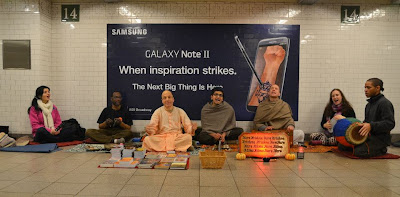Diary of a Traveling Sadhaka, Vol. 8, No. 24
By Krishna-kripa das
(December 2012, part two)
New York City and Albany
(Sent from Gainesville, Florida, on January 30, 2013)
Where I Went and What I Did
When Yadunandana Swami came to serve Satsvarupa Dasa Goswami on December 19, I left my guru’s personal service to go to New York City to chant in Union Square Park with Rama Raya Prabhu and his harinama party. For the rest of the month I lived in our Brooklyn temple, Sri Sri Radha Govinda Mandir, attended the morning program there, and spent two hours afterward chopping vegetables for the temple and its weekday restaurant program, Govinda’s Vegetarian Lunch. Every afternoon from 4 p.m. to 8 p.m. I would chant with Rama Raya Prabhu and his harinama party, consisting of from three to seventeen devotees, at Union Square Park, or on the cold days, in various subway stations at Union Square, Grand Central, Times Square, and Columbus Circle. Sometimes, especially on weekends, we would begin at 3 p.m. or even 2 p.m., and still continue till 8:00 p.m. I took a two-day break for Christmas Eve and Christmas, when I visited my family, my Quaker meeting, and my initiating spiritual master, Satsvarupa Dasa Goswami, along with a few of his disciples including Yadunandana Swami.
I was happy to be visiting New York City at the same time as Radhanath Swami, and I include some notes from his lectures, in addition to some material from Srila Prabhupada directly.
At the end I summarize my activities in the year 2012 and include my annual financial statement and thank my donors. I also talk about what to do differently in 2013.
The Christmas Story Seen from a Hare Krishna Perspective
Twice on Christmas Eve I encountered the story of the appearance of Lord Jesus Christ in this world, once at my Quaker meeting and once reading a book with my relatives, which had become a family tradition at Christmastime since I lived at home, called The Best Christmas Pageant Ever.
Living as a Hare Krishna monk for the last thirty years, I naturally viewed both encounters from the Hare Krishna perspective. Lord Jesus Christ is seen by Hare Krishnas as a realized son of God, and as such, his appearance in and disappearance from this world are spiritual and transcendental, and one advances spiritually by coming in touch with narrations of them. In the Quaker meeting, as newly recruited players from the audience dramatized the script of the event and the congregation sang appropriate songs, I did feel a kind of transcendental joy coming from being in touch with the account and the songs glorifying God and His son. And although it is repeated every year there is a certain freshness and wonder in it.
The Best Christmas Pageant Ever, written by Barbara Robinson in 1971,told of another interesting feature, the transforming power of such narrations. The book is summarized aptly on Wikipedia: “It tells the story of Imogene, Claude, Ralph, Leroy, Ollie, and Gladys, six delinquent children surnamed Herdman. They go to church for the first time after being told that the church offers snacks. Despite protests from other church members, they are given roles in the Sunday school’s Christmas play, in which they tell the Christmas story in a nonconventional fashion.” [Buck, Jerry (1983-12-03). “Meanest kids in town make the best pageant”. The Free-Lance Star.] The interesting feature of that story is that the character of the children changes from demonic to divine as a result of hearing the narration of the appearance of Lord Jesus and from acting it out. Hearing the story the first time, the delinquent Herdmen kids, instead displaying their usual mentality of taking pleasure in causing others to suffer, show sympathy for Mary having to give birth to baby Jesus in such an unsuitable environment as a manger, and in a land ruled by a demonic king. Although the kids previously took pleasure in stealing and destroying property, in the course of enacting Christmas story they end up giving charity, without even desiring anything in return. It all calls to mind a few verses from the ancient India spiritual classic Srimad-Bhagavatam (Bhagavata Purana), namely verses 1.2.17–19 which describe how narrations concerning God and his pure devotee, such as Lord Jesus Christ, cleanse the heart of demonic qualities, such as lust, greed, and anger, bring one up to the platform of goodness. It occurred to me that it was the best Christmas pageant ever because it demonstrated the divine power of the spiritual narration to transform the character from demonic to divine, which really is what religion is all about, not just some dogma one claims to have faith in, but narrations with uplift our consciousness to the plane of loving God and all his children, our brothers and sisters. It also calls to mind another verse, our verse for the week in the Gainesville Krishna House, about the pastimes of the Supreme Lord Himself, which was spoken later in Bhagavatam by His most intimate devotees, “The nectar of Your words and the descriptions of Your activities are the life and soul of those suffering in this material world. These narrations, transmitted by learned sages, eradicate one’s sinful reactions and bestow good fortune upon whoever hears them. These narrations are broadcast all over the world and are filled with spiritual power. Certainly those who spread the message of Godhead are most munificent.” (Srimad-Bhagavatam 10.31.9)
Harinamas in New York
Rama Raya Prabhu, playing harmonium above, who was part of Aindra Prabhu’s 24-hour kirtana in Vrindavan for many years, is focusing his attention on steadily doing harinama each day in Manhattan for at least four hours between 4 p.m. and 8 p.m., and I had the good fortune to join his party for three and a half weeks in December 2012 and January 2013. He has been going out since the end of March 2012. Each day for the last two or three hours we would regularly have around eleven people, and sometimes as many as seventeen!
When it was in the 40s (5-10 C) we would chant in the parks, mostly Union Square but sometimes Washington Square.
But when it was in the 30s or less (below 5 C) we would chant in the subway stations, which were warmer.
We had a beautiful Hare Krishna maha-mantra sign that was decorated and lighted.
Whoever gave some coins or just expressed interest got a Krishna Reservoir of Pleasure or an On Chanting Hare Krishna pamphlet.
Whoever gave a dollar got a small book. If they gave five or more, they got a Bhagavad-gita.
Sometimes people would dance with us.
I would dance at one end of our party.
Almost every day on harinama something special happens, that is something in addition to thousands of people becoming from free from karma and taking a step toward Krishna, which are in themselves pretty amazing wonders.
At the Union Square market, one young man who was loading a truck came up to me and said our incense smoke was blowing down to his work site and making it difficult to breathe. He asked if we could put out the incense for an hour until he was finished. I complied as incense is not an important part of our function. To devotees who were upset I joked that Lord Caitanya did not advent Himself to distribute maha-incense. A few minutes later the man came back with two packages of organic sprouts as a donation. Deva Madhava Prabhu suggested we give them to Radha-Govinda so the donor would make great spiritual benefit, and so we did.
One young Oriental man came up to me and said, “Didn’t I see you in Soho (London) giving the lunch program lecture?” And it was true. I gave lectures there this summer and fall. It is a small world! He said he would be in New York City for ten days and asked about our local programs, and I gave him invitations and details about them all. He said he would come to the Bhakti Center Thursday night kirtana the next day. Another day he came by Union Square to listen to the harinama for half an hour and dance a bit.
One young Christian man stopped by and danced for a while, and then came up to talk to me. He told me how he had just come to New York a week ago and that by the grace of Lord Jesus Christ he had money, a place to stay, and a replacement water bottle for one he recently lost. I told him in the course of our conversation that we accept the Biblical idea that whoever calls on the name of the Lord will be saved, that the best spiritual practice was to sing the glories of the Lord congregationally, and that dancing was an expression of love of God. He seemed to be getting into the kirtana, so I invited him to play an instrument, and he sat down and picked up some karatalas and played a beat of his own that was in time with the music, and he stayed in the kirtanafor fifteen minutes.
One young lady with dog on a leash passed our party, and the dog was focused on the chanting devotees the whole time. Even after his owner had passed us, he continued looking back toward us, coming as close as his leash would permit. I had see children often looking backward toward the devotees as their parents pulled or carried them onward, but never a dog.
Young children are often attracted by the chanting, and some of the parents are very open to let them investigate it. We have some small shakers just for kids to use to play along with the music. Some children live in the neighborhood of Union Square, and their parents regularly bring to the park, and some spend fifteen minutes or even half an hour with us. We have smiling Jagannatha stickers for the kids whose parents give donations. Occasionally the kids dance and attract a crowd.
Once several kids, probably all under ten years old, were sitting with us on our mats, playing the different extra instruments like shakers that we brought for people to play. One boy tried playing every instrument we had a least once, demonstrating a lot of natural rhythm as he did so. The kids seemed happily engaged, and seeing them, passersby were attracted. Thanks to Rasika Gopi Devi Dasi and Bhakta Alex of the Bhakti Center for their beautiful photographs on the Manhattan harinamas.
At Union Square, one couple came up to me, and said, “Are you from Gainesville?” I replied, “Yes.” Turns out they were Tiffany and Joshua, occasional attenders at the Krishna House programs. When they saw the Hare Krishnas, they glanced at the chanters looking for Rasaraja Prabhu, who they knew from Krishna House and who came to New York for the break, and then they saw me. I suggested that Rasaraja would probably be at the Bhakti Center Thursday night kirtana at 7:00 p.m. and they might find him there, and so they did.
At Grand Central Station one young man asked how many of the ten or fifteen people chanting were from Gainesville, and I looked at our party, and seeing Rasaraja Prabhu, told him two. He mentioned how he had Krishna Lunch for four years there, and he really missed it. I told him that we have Krishna Lunch in Brooklyn, and he was overjoyed to hear it, and so I gave him an invitation to the Brooklyn temple and its weekday lunch program.
Also at Grand Central I met a guy from India who knew Hare Krishna and even Radhanath Swami from there, and so I invited him to Radhanath Swami’s Sunday lecture at the Bhakti Center.
Again at Grand Central, one lady exclaimed with joy, “Great! You guys are back! I haven’t seen you in 30 years.”
One young lady smiled and watched us the entire time she was walking past. I asked her how she knew about Hare Krishna. She said, “I just know you from this, but I am attracted to what I see.”
Insights
Srila Prabhupada:
from a lecture on Srimad-Bhagavatam 5.5.2 in Johannesburg on October 22, 1975:
The aim should be how to become a friend of God.
Radhanath Swami:
The spirit in which something is spoken and received needs to be understood to have more than a theoretical understanding.
We do not have to experience the extreme situations that Pariksit and Arjuna experienced to learn from their experience.
Maharaja Pariksit would not be rude to an insect but this world is so arranged that despite all good intentions, we make mistakes, and due to circumstances, we make people miserable although we desire to make people happy. This happens to everyone, and so it happened to the King [who when thirsty was so frustrated due to a meditating sage’s neglect to offer him water, he garlanded the sage with a dead snake and was cursed by the sage’s son to die in seven days].
Krishna can reciprocate everyone’s love simultaneously and fully satisfy them.
Due to false ego we become upset if someone is doing something better than us, or even if they are not doing something better than us, but they are getting more credit for it.
Sometimes when people are good at something you can not get them all together in the same room.
In the early 1970s, eight hundred yogis joined together for the first time for a conference. There had never been such an opportunity before or has there been since. At the end, the main sages and yogis each had 2 minutes to speak. I was in ecstasy. I had hitchhiked to India to encounter enlightened beings, and here was a whole stage full of them. The first person spoke ten minutes, the next person about fifteen minutes. As time went on, about a dozen of them were literally fighting over the microphone. It is on film. It was a great embarrassment—so many ‘enlightened’ people acting in such a way. However at Naimisaranya, the sages unanimously agreed that Sukadeva Goswami would speak. He was not arrogant but asked for the blessings of others.
We talk about it as a curse [that he would die in seven days], but Pariksit saw it as a blessing.
When we see this life as all in all, we see everything in one way, but when we see this is just one of many lives, we see it all differently.
One sage said this life is one point in a line that goes on infinitely. When we understand that, then we can harmonize the blessings and curses we receive. We can focus on the opportunity to advance spiritually.
You say you didn’t make castles out of sand as a kid, but your whole life is probably making castles out of sand.
You see the tide is coming in, and you try to build walls to protect your castle. The parents laugh. Why are you taking your castles so seriously? But the enlightened souls see all that we are doing in Washington and Wall Street to be like castles of sand.
The great sages were not concerned that they speak, but rather that some competent person was speaking nicely.
Pariksit. although cursed to die in seven days, was the happiest man in that glorious assembly of sages with such a great opportunity.
Stokakrishna, my disciple in India, at age 32 was diagnosed with one of the most fast acting forms of cancer. When I came to see him he was paralyzed and emaciated. He said, “Why am I so fortunate that I could chant Lord Krishna’s name so many times in this life? Why did I get to hear so many classes on Srimad-Bhagavatam? I did not deserve that. Why did I get the association of such nice devotees? Why did I get to be part of Srila Prabhupada’s movement?” Because he was so consistently happy in such an externally miserable situation some originally doubtful brahmacaris concluded that he must have a higher realization.
If something is inevitable, we might as well see it as a blessing.
Some friends who were brijbasis [residents of the sacred land of Krishna’s childhood pastimes, Vrindavana] happened to visit America, and I invited them to come to chant at Bhakti Tirtha Swami’s deathbed. One of them, Madana Mohan Brijbasi, was singing so simply and so sweetly, tears poured from Bhakti Tirtha Swami’s eyes in a way that his disciples had never seen. Bhakti Tirtha Swami said that because he could not go to Vrindavana, Vrindavana had come to him in the form of these devotees from Vrindavana. Madana Mohan Brijbasi was also there to chant for my disciple Stokakrishna at the end of his life.
We have to deal with the material world responsibly but keep it in perspective and remember our ultimate spiritual aim.
If when we are fasting, we think, “I am so austere, and look at these people, they are eating,” then our body is fasting but our false ego is feasting. Fasting is meant to humble us and meant to help us to take shelter of Krishna. Then we are really fasting.
Unless we prepare for the exams along the way we will not be prepared for the final exam of death.
When the tests come we have to apply all we learned from previous struggles.
To overcome pride, we have to watch from a detached point of view. If we see ourselves thinking “I am better than others,” that is the weed of pride, which impersonates the creeper of devotion and induces us to water it instead. If we see that we are envying others that is also a manifestation of pride.
Krishnadasa Kaviraja Goswami was selected by the great Goswamis of Vrndavana to write Sri Caitanya-caritamrita because of his great realization, scholarship, and humility.
The title The Journey Home [Radhanath Swami’s autobiography] was selected at last moment. The working title was Autobiography of a Worm in Stool, but the publishers would not accept it.
Satsvarupa Dasa Goswami:
From Begging for the Nectar of the Holy Name, quoted in online in his Viraha Bhavan:
“Here is a quote from an initiation lecture by Srila Prabhupada in July 1970 in Los Angeles. Srila Prabhupada spoke on each of the ten offenses and then said, ‘Then, what is next?’
“Devotee: ‘To become inattentive while chanting Hare Krishna.’
“Prabhupada: ‘Yes, when you are chanting, you should hear Hare Krishna Hare Krishna, Krishna Krishna Hare Hare/ Hare Rama Hare Rama, Rama Rama Hare Hare. You should hear at the same time. Then the mind and the senses are compact. That is samadhi. That is perfection of yoga. This yoga is recommended in the Bhagavad-gita.Yoginam api sarvesam mad-gatenantar-atmana. So everyone, by chanting he should hear.’”
A Summary of the Year 2012
I started the year being part of a 12-hour in our Mexico City temple. At that time, we were on the Vaishnava Youth winter bus tour to Mexico and were blessed by the association of Madhava Prabhu, who takes great pleasure sharing Lord Krishna’s name with others in a mood of complete concentration. A 6-hour kirtana in Dallas, and a final kirtanaby Madhava in Alachua finished off the youth tour, which was the best event I had been part of in the months of December and January. The rest of January I spent assisting Krishna House in Gainesville, and the new weekly programs the devotees started in Jacksonville. In February I visited Satsvarupa Dasa Goswami and our temples in Manhattan and downtown London, on my way to India to attend the Kirtana Mela in Mayapur. After a wonderful Gaura Purnima, bathing in the Ganges and reciting verses about Lord Caitanya’s appearance with Danavira Goswami and some of his followers, I joined Navina Nirada, Ekalavya Prabhu, and others at the Bhakti Experience, a two-week Krishna outreach program in Rishikesh in March. We met some interested people and took down contact information for fifty of them. Some even later visited Vrndavana, although previously they had not known of Krishna. Then I returned for more harinama in Mayapur, after an ecstatic Delhi Ratha-yatra and three days on the 24-hour kirtana party in Vrindavana on the way.
I returned to Europe in April, catching the tail end of a Chennai temple opening enroute, for Kadamba Kanana Swami’s Vyasa-puja and the amazing Queen’s Day harinama in Amsterdam. After Queen’s Day we traveled with Leipzig devotees from Belgium, through Luxembourg and Germany to the Nrsimha farm for Nrsimha Caturdasi, doing harinama in several cities on the way. After that, we spent the rest of May and the beginning of June with Janananda Goswami and his followers, based in Newcastle, England, and doing harinama three hours each day. Janananda Goswami greatly encouraged me in my service of harinama by giving me a wonderful amplifier, money for travel, and assistants to chantwith, as well by as his personal example of complete dedication to harinama and by wisdom shared through lectures. On the way to London for Ratha-yatra I attended the monthly harinama in Manchester, nama-hatta programs in Leeds and Sheffield, and the UK brahmacari conference. For me, the attendance of the brahmacaris in the devotee procession in the Borehamwood Carnival (parade), adding lots of extra energy, was a high point. After London Ratha-yatra, I did harinama in London for a few days with some followers of Janananda Goswami, then attending the Stonehenge Solstice festival, where we chant from midnight to 6 a.m. and distribute prasadam. I was invited to a nonexistent weekend warrior program in Croydon, where I chanted for three hours and distributed flyers for the next day’s Ratha-yatra by myself anyway, collecting 27 GBP for the Soho St. temple sankirtana office. On the way back to Newcastle, Sri Gadadhara and I did the Sunday program in Leeds, and nine devotees from the congregation went with us on harinama afterward, causing us to think perhaps post feast program harinamas may be introduced elsewhere. After all Kharkov, Ukraine, does them every week, even in the winter. After two weeks in Newcastle, I returned to the Manchester area for more harinamaand more nama-hatta programs on the way to Ireland. Ananta Nitai Prabhu traveled with me from Dublin to Belfast, to Govindadvipa, where we chanted at a couple nearby towns, and back to Dublin, where by his inspiration we had organized a 12-hour harinama. He and I both did over eleven hours and other people joined for some of the time. We felt it was so successful that we decided to organize more in the future.
Next I flew to France for three days of harinama in Paris, and then to Switzerland for an evening program in Langenthal and two Jhulan Yatras and a harinama in Zurich. Then by train to Berlin and then Kostrzyn for the Polish Woodstock festival where hundreds of thousands of people hear the holy name and take prasadam. Our harinama at the Kostrzyn train station for the those returning home after the festival was the best ever, and the officials were so pleased with the calming effect the chanting had on the tired crowds they asked us to do it next year. I did a few days harinama in Prague and then on to the kirtana mela in Spain, and three harinamas there, two of which directly inspired people to come to our local temples. Then to Trutnov, Czech Republic, for the Czech Woodstock, where we did lots of kirtana late into the night, and a harinama as well, with our guest, Srila Prabhupada’s disciple Guru Das Prabhu. Next I attended a brief Polish padayatra which gave some transcendental experiences to the residents of the towns near our New Shantipur farm, where we had a weekend nama-hatta festival afterward. Then onward to travel with Janananda Goswami doing harinamas and evening programs in Slovakia and one in Czech Republic. After that, we went with Dhruva, Trevor, and Vamana to the Wroclaw Ratha-yatra, and then the German Kirtana Mela, with three harinamas embedded in it, and followed by the wonderful Leipzig Ratha-yatra. Trevor and I then joined the Nitai Gouranga harinama bus tour for a day from Leipzig to Wroclaw where we did a beautiful three-hour harinama in the square where we had Ratha-yatra the week before. We stayed in Wroclaw and did harinama there, next traveling to Bydgoszcz, where we did harinama and an Ekadasi evening program. Then back to Czech Republic for evening kirtana programs in Trutnov and Prague, and a nama-hatta program in Slovakia. Then on the the Ukraine festival (Bhakti Sangama) with lots of seminars and great three-hour evening kirtanas. Then to Warsaw for Radhastami, and then Simhachalam, the German Nrsimha farm, for the festival for the 30thanniversary of the Prahlada-Nrsimha’s installation, with a few small harinamas on the way. That festival ended with the first ever Passau Ratha-yatra.
Then I returned to the UK to travel with Janananda Goswami in The North of England for the World Holy Name Festival, ending with a harinama and an eight-hour kirtana in Edinburgh, Scotland, a new city and country for me. Dhruva Prabhu and I then went to Belfast, where we were joined by Ananta Nitai for more harinama there, and in the cities of Enniskillen, Dublin, and Bray. Ananta Nitai, inspired by the July 12-hour harinama, planned for a 12-hour harinama on Saturday, followed by the Sunday feast, and a 12-hour kirtana in the temple on Monday. The program was successful enough that he wants to do it the first week of every month. Then I went back to Newcastle for a week or so, and then nine days worth of evening lectures beginning there and including all the nama-hattas nearby Manchester, my third swing through there this year, as opposed to my usual one. We preceded the Bolton nama-hatta with the monthly harinamaand were encouraged to see several local children enthusiastically taking part for forty-five minutes. Back to London for a few days with more harinama and lectures, including four hours of harinamaon Halloween, while waiting for New York airports to be reopened after hurricane Sandy.
Then back home to America for a week on harinama in Manhattan with Rama Raya and Ekalavya Prabhus, some days on a book production marathon for Satsvarupa Dasa Goswami’s The Story of My Life, and a brief visit to my family in Albany. Then I flew to Jacksonville where I chanted on the campus for two hours, meeting a couple people I who had come to our programs back in January and a nice Indian man who started coming to our Jacksonville programs as a result. Then I caught the end of a beautiful ceremony in honor of Srila Prabhupada’s disappearance in Alachua with a wonderful feast. The next several days were many evening kirtanas leading up to the 24-hour kirtana, the Friday and Saturday after Thanksgiving and it was great to hear Madhava Prabhu so much. The 24-hour kirtana was special this year with guests Niranjana Swami and Agnidev Prabhu. Dravida Prabhu led for two hours on a wonderful harinama in Tallahassee that Saturday at the last football game of the season. Then a couple weeks at Gainesville’s Krishna House, and another evening at our Jacksonville program on the way to fly north for Satsvarupa Dasa Goswami’s Vyasa-puja in December in Stuyvesant, where I cooked breakfast and lunch for him for nine days afterward, punctuated by a harinama in Hudson and a day trip to New York City to see Niranjana Swami and do kirtana and harinama. Then we ended the year with eleven days of four hours of harinama in Manhattan, with two-day visit to my family for Christmas in the middle.
Niranjana Swami advised I go to fewer places and stay longer and try to increase the devotional service in those places, and reading the above account where I travel to fifteen countries, it sounds like I was a dismal failure. I did, however, spend 53 days in Newcastle, England, 43 days in Gainesville, 39 days in The Northern UK and Ireland, and 18 days doing harinama in New York City. Successes include new people coming to the temple from the harinamas in Newcastle, Belfast, Sheffield, and Jacksonville, a new popular program, the back-to-back 12-hour harinama and 12-hour temple kirtana in Dublin, and a string of nine evenings of lectures in a different cities in England each night. By the inspiration of Janananda Goswami, we also went to towns where devotees rarely if ever to harinama, so new people got exposure to the recommended spiritual practice of the age. Incidentally, the guy who came from harinama to the Belfast temple bought four books. The best comment on harinama was “seeing your party was the best part of my trip to Dublin” by a girl from Seattle.
With the blessings of my advisers Niranjana Swami and Janananda Goswami, I hope to increase my focus and continue to try to spend more time in fewer places, trying to bring people to a higher level of devotion, including myself. I am thinking of just spending one month in Europe in the summer instead of two, and going to the Lithuanian festival instead of the Ukraine festival so I can return to England and New York sooner.
Financial Statement for 2012
Srila Prabhupada taught his followers to keep careful records of expenditures. People always wonder how devotees get their money and how they spend it. Here is a summary for me for 2012. If for some reason, you want more details, let me know.
INCOME donations
book sales
total income
EXPENSES travel
gifts to temples, swamis, etc.
maintenance (clothes, medicine)
internet, phone, computer, etc.
festival fees
loans
food (bhoga, prasadam)
rent
unaccounted for expenses
total expenses
balance |
4107.59 18.32 -------- 4125.91
3360.59 277.06 88.54 72.25 63.00 50.00 39.25 24.75 130.41 -------- 4105.85
-20.06 |
I would like to thank all the very kind and generous people and organizations who contributed to my expenses so I could share the congregational chanting of the holy name with people in fifteen countries this year. These include, with those contributing the most listed first, GN Press, Kalakantha Prabhu, Kaliya Krishna Prabhu, the devotees in Manchester (England), my mother (Pat Beetle), Rama Raya Prabhu, Paramesvara Prabhu and his congregation in Modra (Slovakia), Bhakta Clive, Ali Krishna dd, Janananda Goswami, Touchstone Publishing, Vrajendralal Prabhu, Bhakta Andy (Gainesville), Bhakta Steve (Belfast), Dr. Dina Bandhu Prabhu, Raj Sharma, the congregation in Leeds, Balarama Prabhu (Opole, Poland), the Nama-hatta leaders in Poland, the devotees in Langenthal (Switzerland), the JPS office in Mayapur, Prema Sankirtana Prabhu of Newcastle, Ramai Prabhu of Sunderland, Sidharth from Michigan (who bought me some very nice boots for cold weather harinamas), Pandava Prabhu, Govinda Prabhu from Scotland, Bhakta Andrzej, Bhakta Doug, Bhakta Sumit, Bhakta Suresh, Parananda Prabhu, Gaura Karuna Prabhu, Tara Prabhu, Adi Karta Prabhu, Kishore Prabhu, Bhaktin Padma, Ramiya Prabhu, the over twenty people who donated less than twenty dollars each, and all the people who bought books on harinama. I hope Lord Caitanya blesses them all with some of the transcendental merit from our sharing the congregational chanting of the holy name with the people in general.
-----
yei yahan tahan dana kare prema-phala
phalasvade matta loka ha-ila sakala
“The fruit of love of God is so delicious that wherever a devotee distributes it, those who relish the fruit, anywhere in the world, immediately become intoxicated.” (Sri Caitanya-caritamrita, Adi-lila 9.48)












































